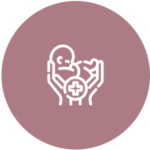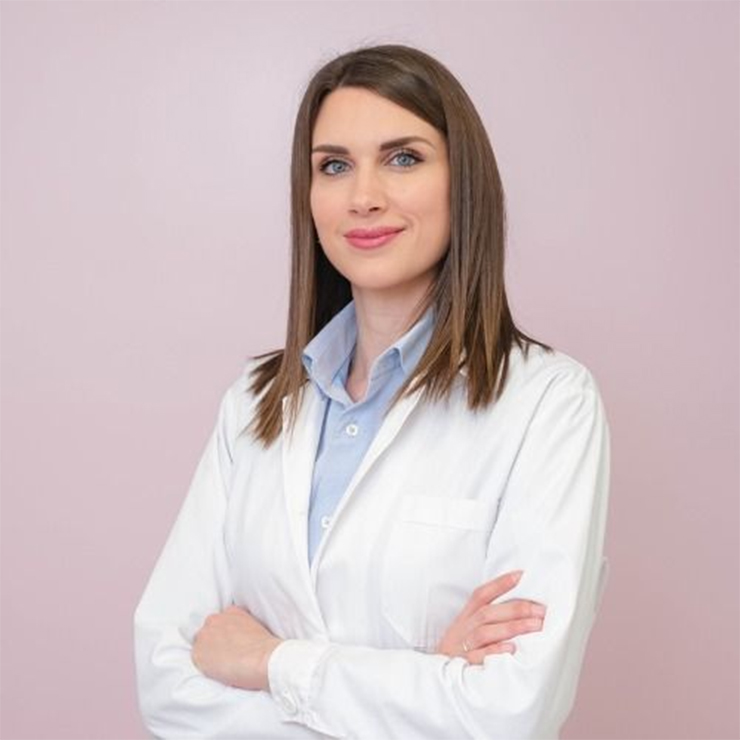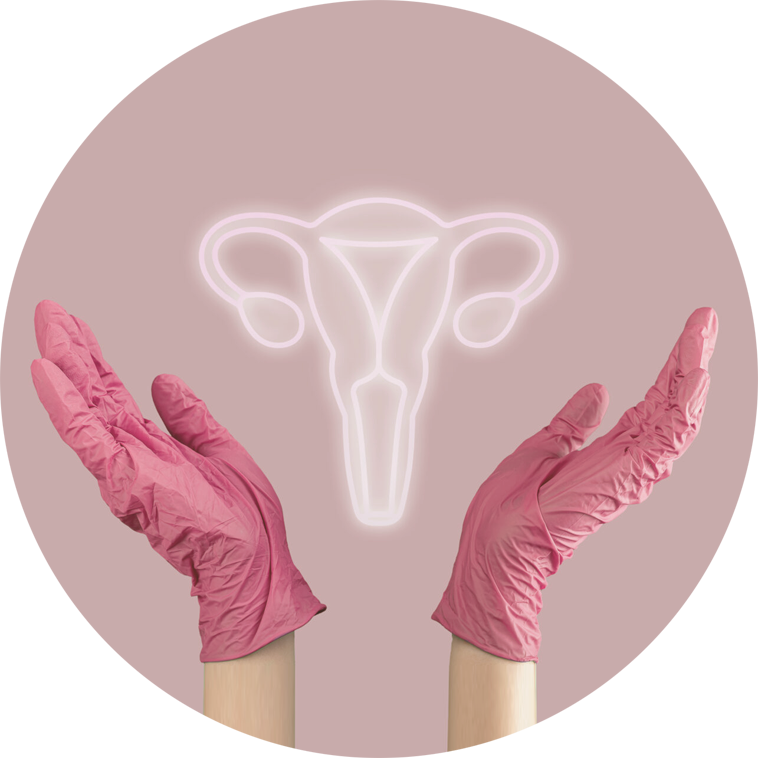
She is an Obstetrician-Gynaecological Surgeon and Assisted Reproduction Specialist with a private practice in Argyroupoli.

Το ιατρείο
Our gynecological clinic offers comprehensive health services for every stage of your life.

Contact
We are here to provide authoritative and expert care, answering your questions with respect and confidence.

Athanasia Despotidi is an Obstetrician-Gynaecological Surgeon and Assisted Reproduction Specialist with a private practice in Argyroupoli. She graduated from the Medical School of the University of Patras after her admission with Panhellenic examinations. She completed her specialization in Obstetrics and Gynecology at the 3rd University Obstetrics and Gynecology Clinic of the National and Kapodistrian University of Athens at "Attikon" Hospital. During her residency, she had the opportunity to be trained in a variety of obstetric cases and in the whole range of gynecological surgeries. After obtaining her specialty degree, she gained special experience in the treatment of infertility and assisted reproduction techniques at the Medically Assisted Reproduction Unit of the Attikon University Hospital. She is a graduate of the Postgraduate Program of Studies "Pathology of Pregnancy" with the grade "Excellent" and a PhD candidate of the Medical School of the National and Kapodistrian University of Athens. She holds an ICOG (Instructors Course in Obstetrics and Gynecology) and is a trainer of ALSO (Advanced Life Support in Obstetrics), a worldwide program which, through seminars, helps health professionals in the management and treatment of obstetric emergencies. She is a member of the British Fertility Society (BFS), the International Society of Gynecological Endocrinology (ISGE), the European Society of Human Reproduction and Embryology (ESHRE), the Hellenic Society of Gynecological Endocrinology and the Union of Obstetricians and Gynecologists of Greece. She has a rich scientific work consisting of publications in foreign and Greek scientific journals and participation as a speaker in international and Greek conferences. She is an associate of the Medically Assisted Reproduction Unit YGEIA IVF EMBRYOGENESIS and the clinics MITHERA, REA, LETO
Services
Η Μαιευτήρας-Γυναικολόγος Athanasia Despotidi, παρέχει υψηλού επιπέδου υπηρεσίες, με επαγγελματισμό και ασφάλεια. Στο ιατρείο της παρέχει τις ιατρικές της υπηρεσίες με σεβασμό απέναντι σε κάθε γυναίκα, βασισμένη στην εμπειρία της και τις επιστημονικές της γνώσεις. Συνήθεις παθήσεις ή συμπτώματα που εξετάζει η γυναικολόγος είναι τα ακόλουθα:

Gynaecology
Η γυναικεία υγεία είναι πολύτιμη και απαιτεί συνεχή φροντίδα. Στο ιατρείο μας παρέχουμε σύγχρονες και ολοκληρωμένες γυναικολογικές υπηρεσίες , προσαρμοσμένες στις ανάγκες της κάθε γυναίκας σε κάθε στάδιο της ζωής της.

Obstetrics
Η εγκυμοσύνη είναι ένα μοναδικό ταξίδι, και η φροντίδα σας αποτελεί τη δέσμευσή μας. Είμαστε εδώ για να σας στηρίξουμε από την πρώτη ημέρα της κύησης μέχρι τον τοκετό, εξασφαλίζοντας τη δική σας ασφάλεια και την υγεία του μωρού σας.

Assisted Reproduction
Η υπογονιμότητα αφορά ένα σημαντικό ποσοστό ζευγαριών παγκοσμίως και αποτελεί ένα από τα πιο κοινά ζητήματα στον τομέα της γυναικολογίας και της υποβοηθούμενης αναπαραγωγής. Αν και μπορεί να συναντηθεί και στους δύο συντρόφους, οι αιτίες μπορεί να διαφέρουν, και η διάγνωση και θεραπεία απαιτούν εξειδικευμένη προσέγγιση.
Experience

Infertility
Method of treatment: We talk about infertility when a couple who have been having regular intercourse for more than a year has failed to achieve the desired pregnancy. The inability to conceive within this period may also be due to psychogenic factors (stress), but medically it is considered an indication of infertility, i.e. it may conceal a fertility problem for one or both partners and it is necessary for the couple to be examined by a specialist. In couples where the woman is over 35 years old, the period to be considered before fertility testing is 6 months of trying with free intercourse. According to various epidemiological studies and WHO estimates, approximately 8-12% of couples of reproductive age experience some form of difficulty in trying to have offspring. Couples may experience infertility problems due to different factors such as male or female infertility, or a combination of the two. In some cases the cause of infertility cannot be identified (unexplained infertility).It is important to know that fertility counselling is not the same as health counselling. The evaluation of the findings and the choice of the combination of infertility treatment techniques is based on the scientific background of the gynaecologist who is a specialist in reproductive issues. Once the causes of infertility have been investigated, there are many treatment options available to help couples achieve childbearing and family formation. Thanks to the rapid developments in the field of Assisted Reproduction, infertility problems today can be successfully treated.

IVF
Method of treatment: In Vitro Fertilization (IVF) is the assisted reproduction method with the highest success rates compared to the other methods (induction of ovulation, insemination). In summary, the steps of IVF include: the collection of oocytes from the woman's ovaries using the ovulation method, their fertilisation in the embryology laboratory with the partner's sperm, the cultivation and development of the embryos in incubators in the laboratory and finally the embryo transfer. During the embryo transfer procedure, the embryos are transferred into the endometrial cavity with the help of a thin catheter. The embryos implant on their own in the endometrium, as in normal conception, and the desired pregnancy results. Although the same basic principles of treatment govern all IVF protocols, there is no one protocol that is effective for all patients. Instead, it is very important that the reproductive gynecologist takes a personalized approach for each couple in order to optimize the chances of a successful outcome. The fertility journey is unique to each woman and the care she receives during this endeavor should be just as unique. Today, the medical therapeutic solutions available to science and technology have excellent results in the treatment of infertility, while IVF with modern techniques is completely safe for the health of the mother and the newborn. One of the most important steps before IVF is counselling. The choice of the most suitable fertility treatment is based on the history and cause of infertility, the age of the couple and their desire. The assisted reproduction specialist together with the couple will develop the strategy to be followed for their common goal of conceiving and achieving pregnancy.

Oocyte freezing
Method of treatment: Oocyte cryopreservation or egg freezing using the vitrification technique is the most appropriate and effective method of fertility preservation in women of reproductive age. Female reproductive potential diminishes significantly and progressively with age and this becomes even more evident after the age of 35, which is why the age of 35 is considered a cut-off point for women seeking egg freezing. The aim is to collect a sufficient number that can potentially ensure a pregnancy in the future. Even if sufficient eggs are not initially obtained, the procedure can be repeated. The choice of the assisted reproduction specialist and the collaborating embryology laboratory is of utmost importance for the successful outcome of the procedure. By freezing eggs through the modern technique of vitrification, any woman of childbearing age who is facing medical reasons that may damage her fertility in the future (chemotherapy or radiotherapy for cancer, autoimmune diseases, endometriosis, early menopause, etc.) can be able to have her eggs frozen. a) or who wishes to delay childbearing (career, studies, lack of a suitable partner, financial circumstances, other personal reasons) has the ability to store her genetic material and preserve her fertility for future pregnancies. During the egg freezing process, the woman undergoes ovarian stimulation in order to produce multiple eggs. This stage lasts 10-12 days from the beginning of the period. This is followed by the ovulation stage, during which the Gynaecologist Reproductive Gynaecologist collects eggs transvaginally from the ovaries using a needle. The eggs collected are examined for quality by the Embryologist and frozen by the vitrification method. The egg collection procedure is performed under mild general anaesthesia (intoxication). The woman has to refrain from work on the day of the ovulation but the next day she returns to her normal daily routine.
Patient Reviews
Investigate my case (%)
Inspired confidence (%)
Experienced & knowledgeable (%)
Consistent (%)
Friendly (%)
100% reliable reviews from directories

10 from 41 reviews


5 from 21 reviews



